浄智寺(鎌倉)/ Jochiji temple in Kamakura
布袋尊がいる「浄智寺」、苔生す感じが良かった。/ Hotei -son (God) is in “Juchiji”. The feeling of moss growing is good.
6月27日、特に予定がなかったこともあり、先週に引き続き鎌倉の社寺廻り。
On June 27, there were no special plans, so I went around the Shinto shrines and Buddhist temples in Kamakura, continued from last week.
28日は、全国的に大雨の予想があるため、出かけるなら27日ということで、「北鎌倉」の「あじさい寺」である「明月院」と「浄智寺」にいくことに。
Since heavy rain is expected on the 28th nationwide, so I decided to go to “Meigetsuin”, called for “hydrangea temples”, and “Jochiji” near the Kita-Kamakura station.
■目次
- 明月院(閉館) / Meigetsuin Temple (closed)
- 浄智寺の表参道と石橋 / Approach and Stone bridge of Jochiji templ
- 浄智寺 総門 / Main Gate of Jochiji temple
- 浄智寺 山門 / Gate with bell tower of Jochiji temple
- 浄智寺 仏殿 / Jochiji Main Hall
- 庭園 / Garden
- 横井戸 / Horizontal Well
- やぐら / Cave to live
- 布袋尊 / Hotei-san
- 布袋尊とは / What is Hotei God?
- 鎌倉江の島七福神 / Kamakura Enoshima 7 Lucky Gods
- 浄智寺裏門 / Back gate of Jochiji temple
- まとめ / Summary
■明月院(閉館) / Meigetsuin Temple (closed)
ところが、行く前にHPを見ておくべきだったね。「明月院」は、土日閉館でした。それでも、北鎌倉駅から、それなりの人の波が「明月院」に流れて、そして、皆一様に残念感をもって、引き返す感じでした。
However, I should have looked at the HP before I went. “Meigetsuin” was closed on Saturdays and Sundays to prevent coronavirus. Even so, from Kita-Kamakura Station, a wave of people flowed to “Meigetsun”, and everyone felt like turning back with regret.
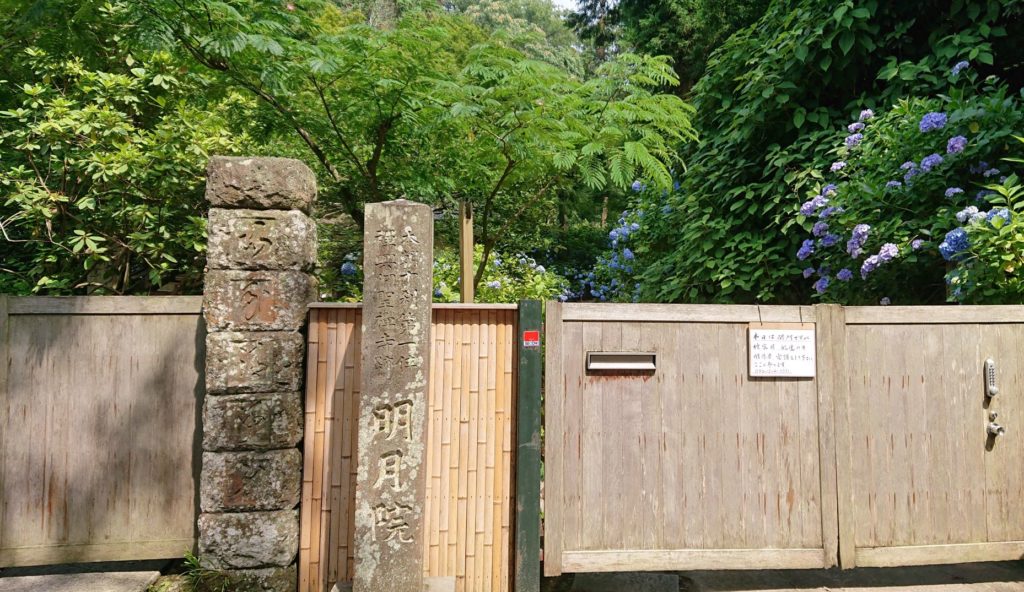
しかし、門の上からは、綺麗なブルーの紫陽花が見えていました。(平日に来れるかな。来年かな?)
However, a beautiful blue hydrangea was visible from the top of the gate. (Is it possible to come on weekdays, next year?)
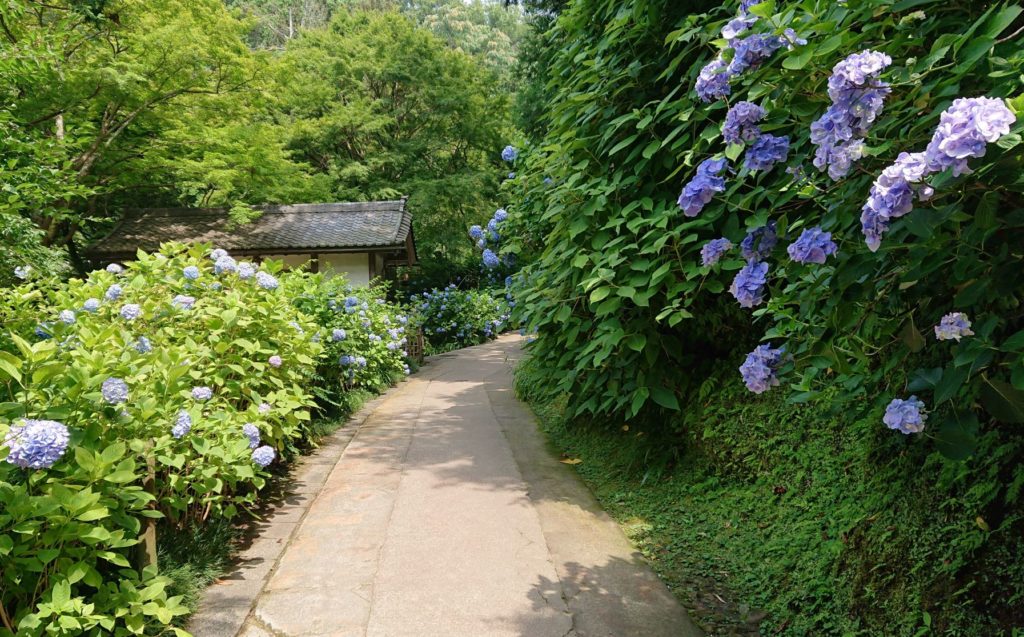
■浄智寺の表参道と石橋 / Approach and Stone bridge of Jochiji temple
さて、気を取り直して「浄智寺」です。
Now on, let’s regain my mind and go to “Jochiji temple”.
予想外に良かったです。
“Jochiji temple” is better than expected
まず、苔生した石橋。2mくらいの長さでアーチ状の橋です。下には、小さな池があり、池の淵には、植物があり季節によって花を咲かせています。
First, there is a moss-covered stone bridge. It is an arch-shaped bridge with a length of about 2 m. There is a small pond below, and on the edge of the pond, there are plants and flowers in season.
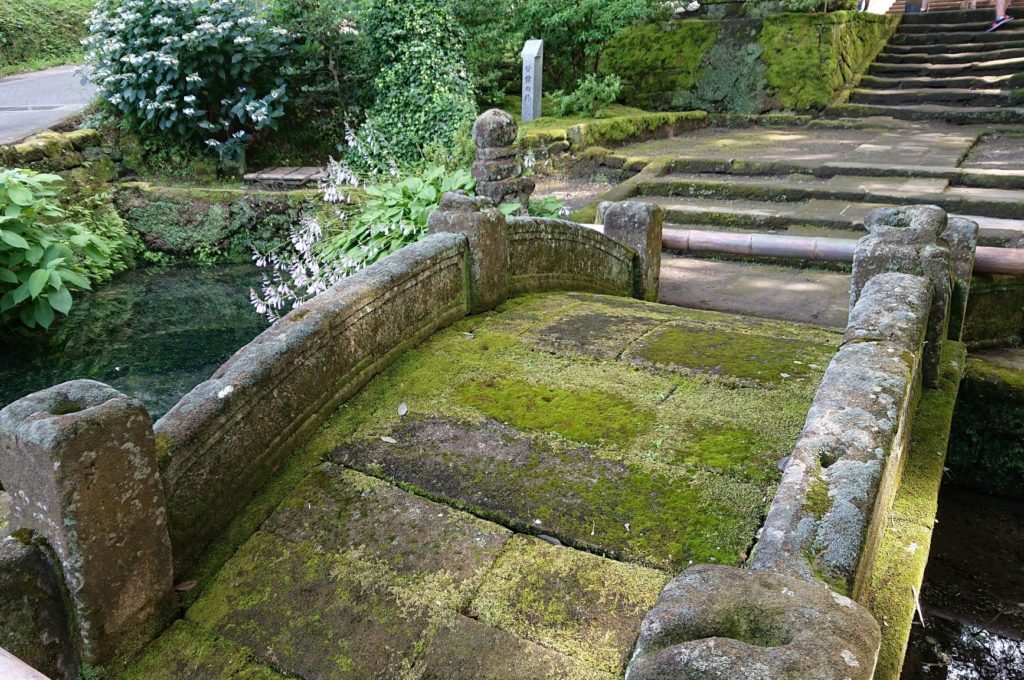
この石橋は渡ることができないので、池の淵を通って参道を歩きます。こちらも苔生した石階段と縁石で、古都鎌倉にふさわしい雰囲気が楽しめます。周囲の木々も手入れがされており非常に落ち着く気持ちになれます。
This stone bridge cannot be crossed, so people go to the approach through the pond. The approach also has mossy stone stairs and curbs, so you can enjoy the atmosphere suitable for the ancient capital of Kamakura. The surrounding trees are well maintained and you can feel very calm.
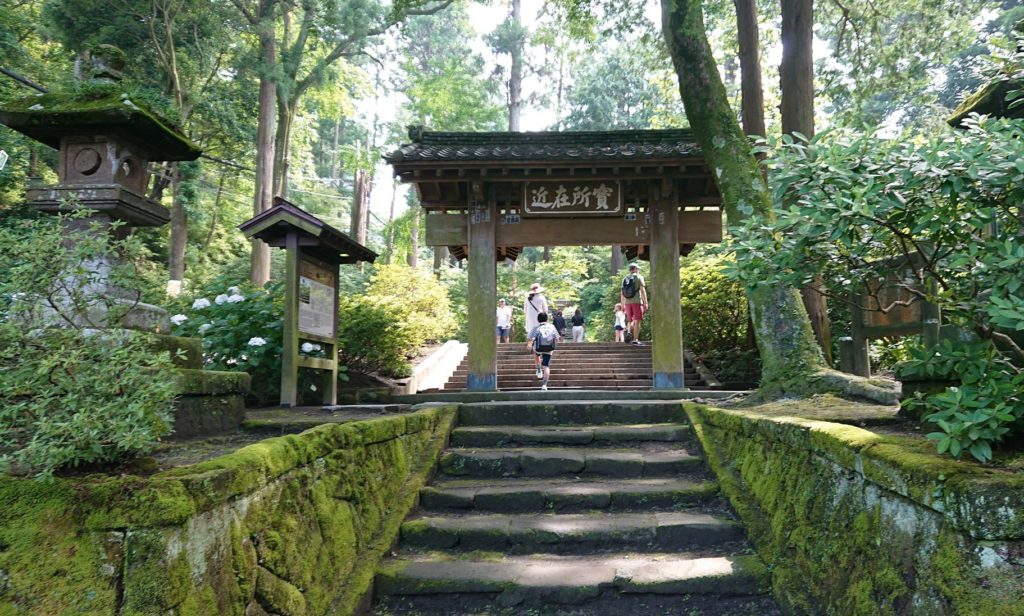
■浄智寺 総門 / Main Gate of Jochiji temple
「総門」を潜ると、植物に囲まれた石階段が続きます。春には、つつじが有名です。その先に見えるのが「山門」です。
If you pass through the main gate, you will find a stone staircase surrounded by plants. Azaleas are famous in spring. after that you can see famous gate, called for “Sanmon”.
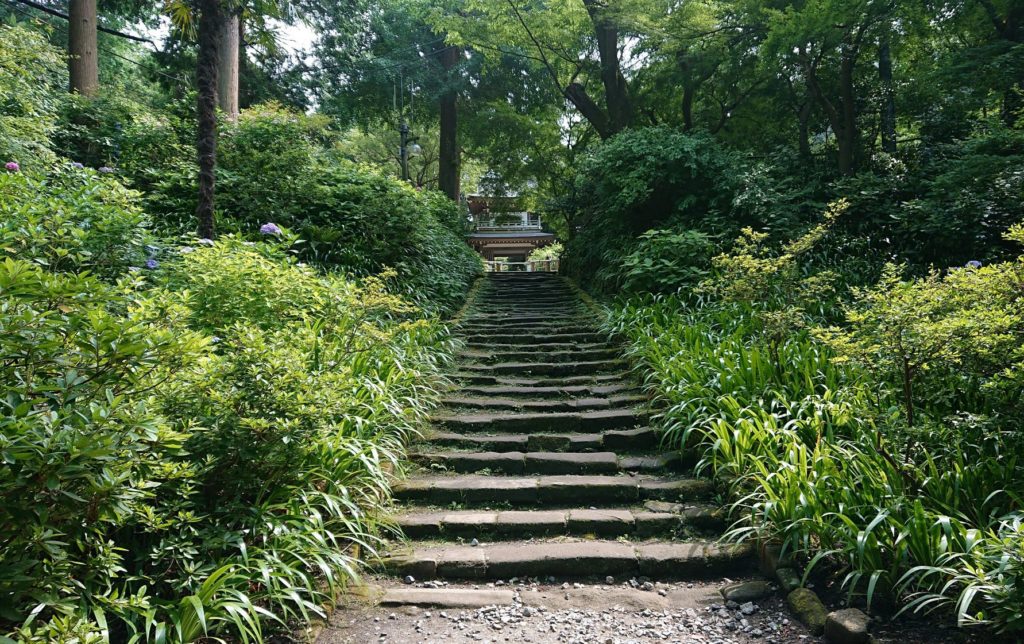
■浄智寺 山門 / Gate with bell tower of Jochiji temple
「山門」は、鐘楼を上に備えた珍しいものです。
The “Sanmon” is a rare one with a bell tower on the top.
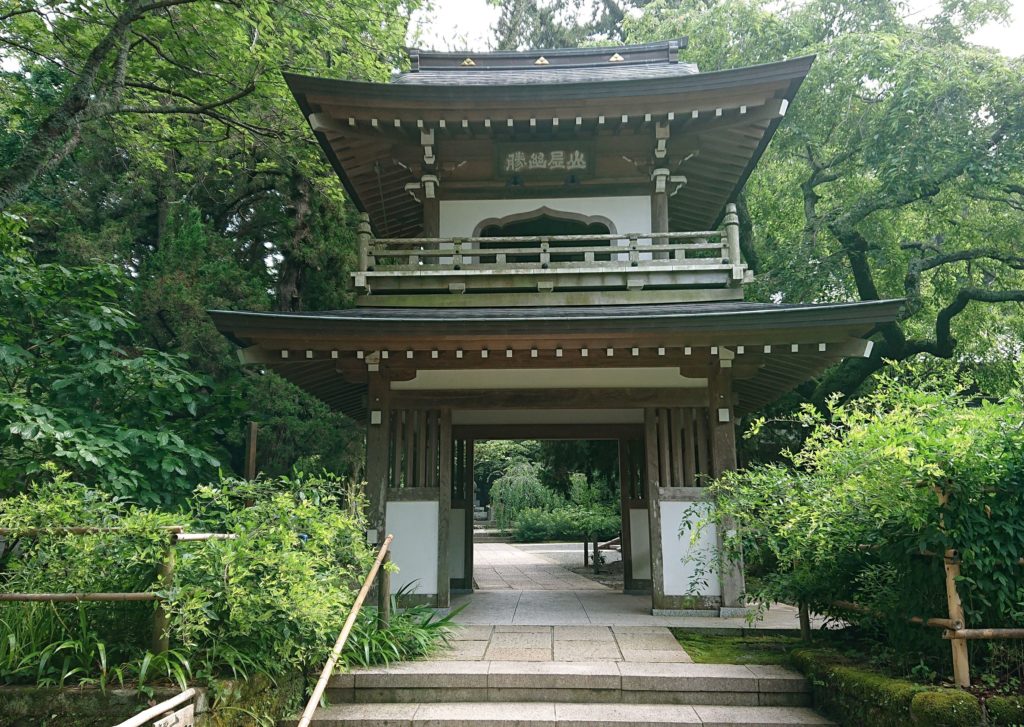
■浄智寺 仏殿 / Jochiji Main Hall
入場料200円(大人)(子供は100円だったと思います)で、中に入ります。「山門」を過ぎると、目の前に、仏殿が立っています。
The entrance fee is 200 yen (adult) (I think it was 100 yen for children), and you can enter inside. After passing the “Sanmon”, the Buddhist temple stands in front of you.
ここには、室町時代につくられた「三世仏座像」が安置され、「阿弥陀」「釈迦」「弥勒(みろく)」がそれぞれ、過去・現在・未来を意味してるようです。
Here, the sitting statues of three Buddhas made in the Muromachi era are enshrined, and “Amida”, “Shaka” and “Miroku” mean the past, present and future respectively.
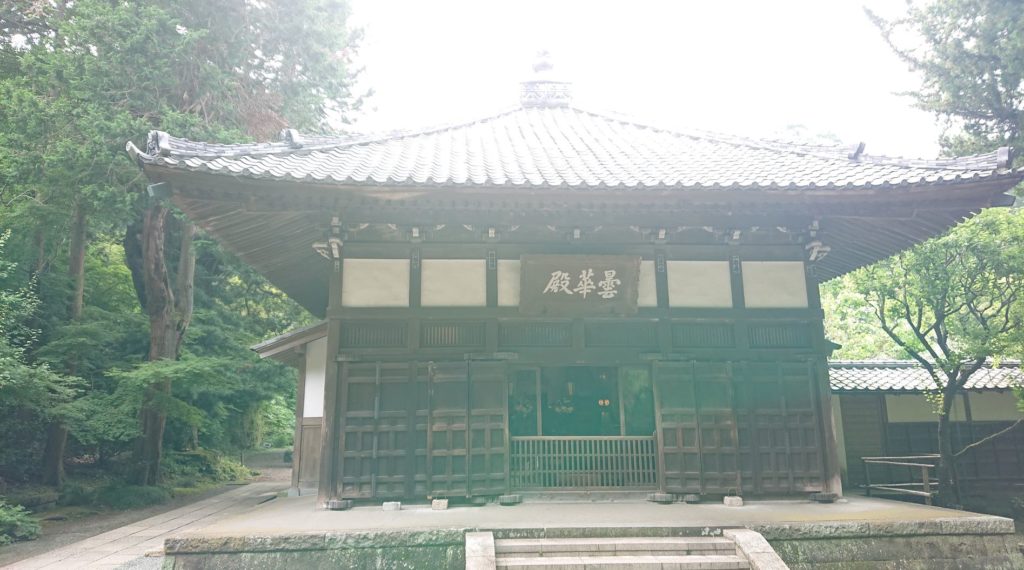
■庭園 / Garden
藁葺屋根の「番札所」から見るための庭園が広がっています。
There is a garden that you can see best from the thatched roof guard station.
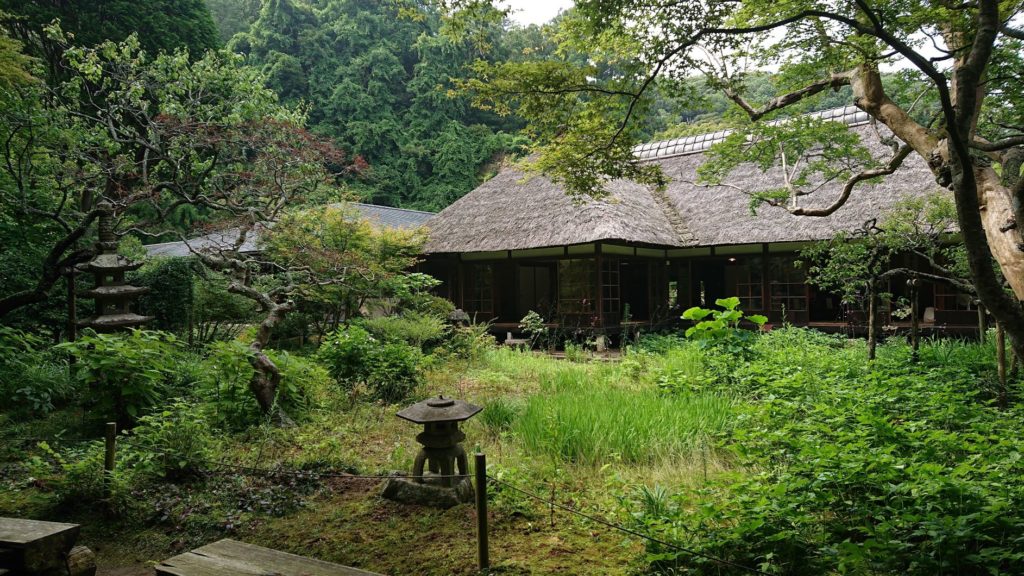
■横井戸 / Horizontal Well
昔用水のために作られた「横井戸」です。石を穿って作ったような四角の横井戸です。看板には、30年前までコウモリが住んでいたとのこと。明かりがないので、中には流石に入る気が起きませんが、どのくらい奥まで空いているのか気になります。見える範囲で3m以上はありますが、右に折れているので、その先は不明です。
It is a horizontal well called for “Yoko Ido” to keep water in the old days. Horizontal well is a square shape by being worn hard stone. The sign says that bats lived 30 years ago. Since there is no light, I don’t feel like going into the inside, but I am wondering how deep it is. There is more than 3m in the visible range, but since it is bent to the right, the destination is unknown.
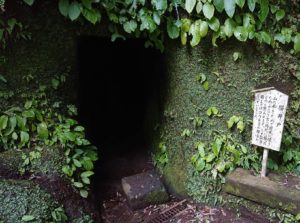
■やぐら / Cave to live
「やぐら」と書かれた看板があり、洞窟のような穴がいくつかあります。以前、人が住んでいて、それからお墓になって、その後(大正~昭和初期)、薪や木炭の倉庫になったそうです。
There is a sign that says “Yagura,” and there are several cave-like holes. There used to be people living there, and then it became a grave, and then (from Taisho to early Showa) it became a warehouse for firewood and charcoal.
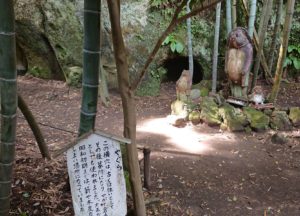
「布袋尊」のエリアに行くためのトンネルです。横幅は狭く、階段があります。
■布袋尊 / Hotei-san
It is a tunnel to reach the area of “Hotei-san”. Its width is narrow and there are stairs.
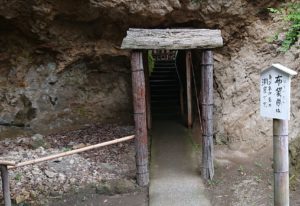
江ノ島鎌倉の「七福神」の「布袋尊」です。家庭円満の神様です。
It is “Hotei-san”, one of “Seven Lucky Gods” in Enoshima and Kamakura. It is the god of family satisfaction.
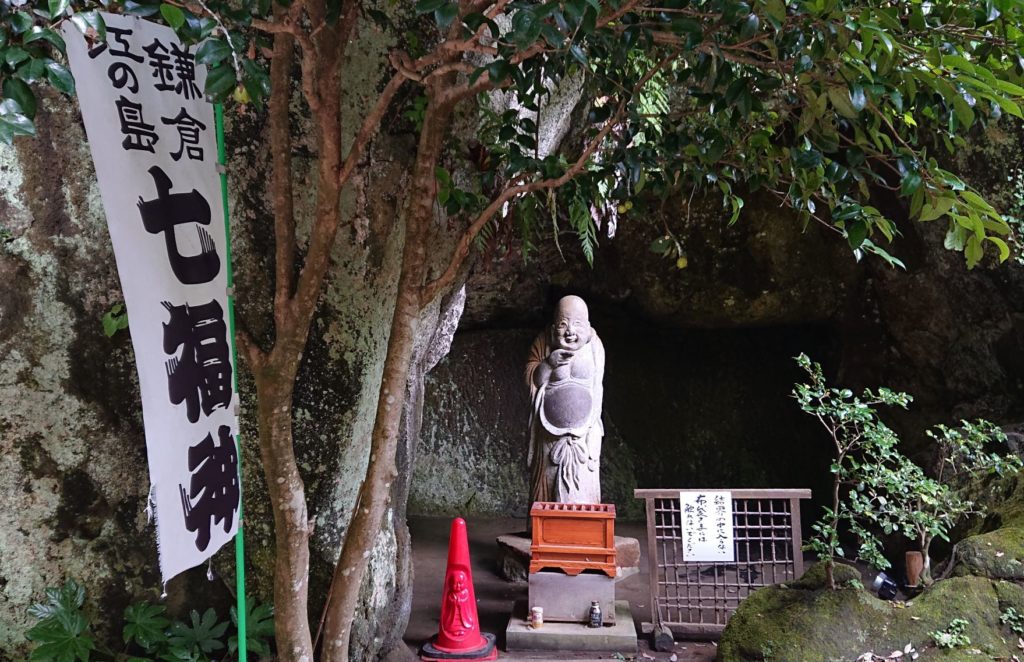
■布袋尊とは / What is Hotei God?
Wikiによると、実在した仏僧で、本来の名は契此(かいし)、あるいは釈契此(しゃくかいし)。実際に、いつも袋を持っていたので布袋と名付けられた。
According to Wiki, it is a real Buddhist monk whose original name is Kaishi or Shakukaishi. In fact, he always had a bag, so it was named Hotei.
布袋は、素直な気持ちの持ち主で、人々を満ち足りた気持ちにさせる不思議な力を持っていたといわれている。広い度量や円満な人格、また富貴繁栄をつかさどるものと考えられ、所持品である袋は「堪忍袋」とも見なされるようになった。水墨画の好画題とされ、大きな袋を背負った太鼓腹の僧侶の姿で描かれる。
Hotei is said to have an honest feeling and a mysterious power to make people feel satisfied. It is believed that it is responsible for a wide range of talents, a generous personality, and prosperity of wealth, and the bag, which is a personal belonging, has come to be regarded as a “patient bag.” It is said to be a popular ink painting title, and is depicted in the form of a drum-bellied monk carrying a large bag.
「布袋尊」は、下図の中断左の神様。
“Hotei-san” is located at the left in the middle line of the below figures.
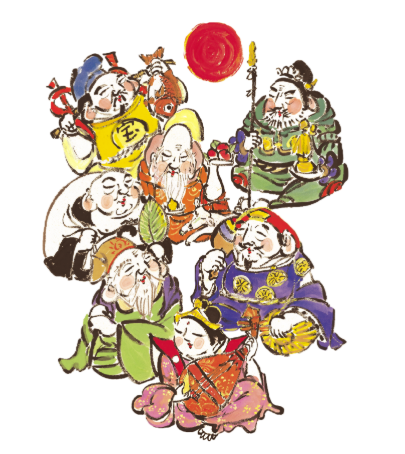
■鎌倉江の島七福神 / Kamakura Enoshima 7 Lucky Gods
ちなみに、「鎌倉七福神」は、以下の通り。「北鎌倉駅」から「長谷駅」まで、徒歩5kmのコースです。その鎌倉の七福神プラス江島天神の弁財天。
By the way, “Kamakura 7 Lucky Gods” is as follows. It is a 5km walk from “Kita-Kamakura Station” to “Hase Station”. Plus Enoshima Shrine.
- 浄智寺:布袋尊(家庭円満)(ブログ)
- 鶴岡八幡宮:弁天(芸、財運)
- 宝戒寺:毘沙門天(病魔退散、財宝富貴)(ブログ)
- 妙隆寺:寿老人(長寿)(ブログ)
- 本覚寺:夷尊神(商売繁盛、五穀豊穣)(ブログ)
- 長谷寺:大黒天(出世、開運)(ブログ)
- 御霊神社:福禄寿(知恵)(ブログ)
- 江島神社:弁財天(ブログ)
- Jochiji Temple: Hotei-san (family satisfaction) (Blog)
- Tsuruoka Hachimangu: Benten (artistic and financial fortune)
- Hokaiji Temple: Bishamonten (disappearance of illness and increasing treasure) (Blog)
- Myoryuji Temple: Jurojin (longevity) (Blog)
- Honkakuji Temple: Ebisu (prosperous business, fertile crops) (Blog)
- Hasedera Temple: Daikokuten (prosperity, good luck)(Blog)
- Goryo Shrine: Fukurokuju (wisdom) (Blog)
- Enoshima Shrine: Benten(Blog)
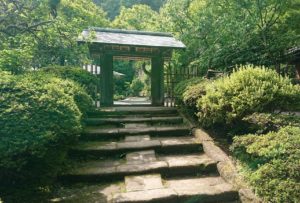
■浄智寺裏門 / Back gate of Jochiji temple
「布袋尊」から戻り、トンネルに入らず左手から裏門に出ます。裏門もいい雰囲気です。
Returning from Hotei-san, You can see the back gate. It also has a nice atmosphere.
ここ「浄智寺」にも、敷地内には、紫陽花の花が咲いています。
Hydrangea flowers are also blooming on the grounds of “Jochiji” here.
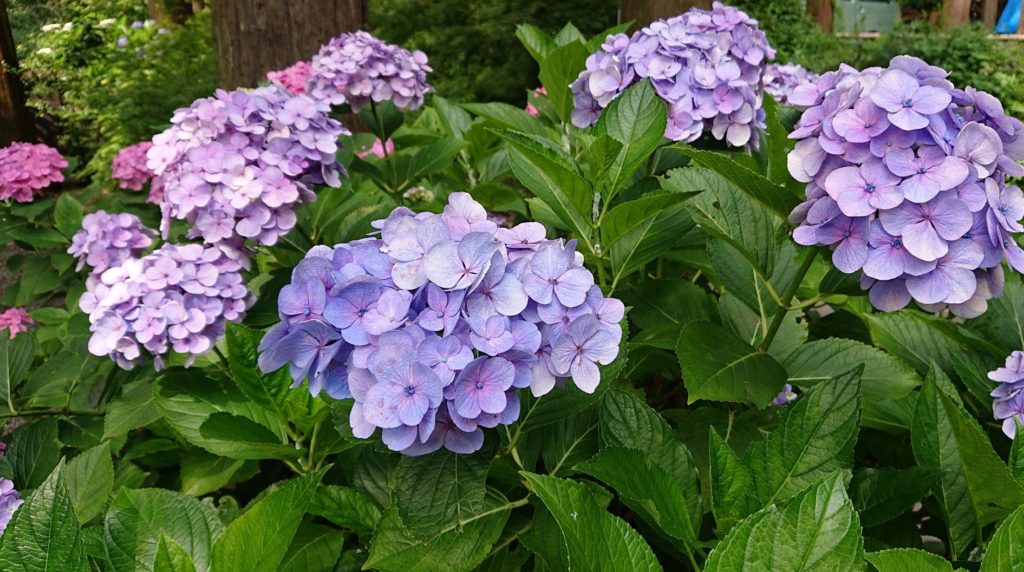
■まとめ / Summary
「明月院」の紫陽花に期待しての北鎌倉でしたが、「明月院」は、閉館でした。しかし、思いがけず訪れた「浄智寺」で「鎌倉江の島七福神」の「布袋尊」を見ることができたのが収穫でした。
I was expecting the hydrangea of “Meigetsu-in”, but it was closed. However, it was a harvest that I could see “Hotei-san” of “Kamakura Enoshima Seven Lucky Gods” at “Jochiji” I visited unexpectedly.
山門も、鐘楼を兼ねたもので、見ごたえがありました。
The mountain gate also equipped a bell tower, and it was impressive.


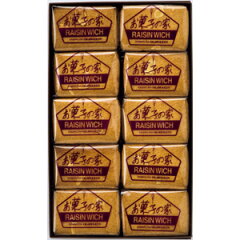

この記事へのコメント